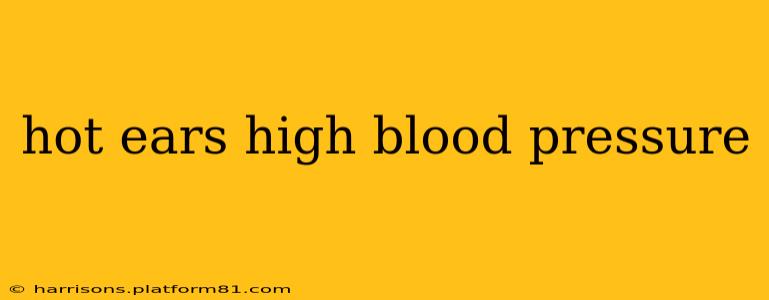Experiencing hot ears and simultaneously dealing with high blood pressure can be concerning. While hot ears aren't a direct symptom of high blood pressure (hypertension), they can be associated with underlying conditions that also contribute to hypertension, or they can be a symptom of other factors that temporarily raise blood pressure. Let's explore the potential connections and what you should know.
Can High Blood Pressure Cause Hot Ears?
High blood pressure itself doesn't directly cause hot ears. The feeling of hot ears is usually due to increased blood flow to the face and ears. This increased blood flow can be triggered by various factors, some of which can also be related to or exacerbate high blood pressure. It's more accurate to say that certain conditions contributing to hot ears might also be contributing factors to, or consequences of, high blood pressure.
What Other Conditions Can Cause Both Hot Ears and High Blood Pressure?
Several underlying health issues can lead to both hot ears and elevated blood pressure. These include:
Menopause:
Hot flashes, a common symptom of menopause, can cause a sudden feeling of warmth, including hot ears. Hormonal changes during menopause can also contribute to increased blood pressure in some women.
Anxiety and Stress:
Anxiety and stress can trigger a "fight-or-flight" response, leading to increased heart rate, blood pressure, and sometimes, flushing or hot ears. Chronic stress is a significant risk factor for hypertension.
Alcohol Consumption:
Excessive alcohol consumption can temporarily raise blood pressure and also cause flushing and hot ears. Long-term alcohol abuse significantly increases the risk of developing high blood pressure.
Certain Medications:
Some medications, including certain antidepressants and blood pressure medications themselves (paradoxically), can have side effects that include flushing or hot ears. Always consult your doctor if you experience new symptoms while taking medication.
Fever:
A fever causes vasodilation (widening of blood vessels), leading to increased blood flow to the skin's surface, including the ears. Fevers can also temporarily raise blood pressure.
Thyroid Problems:
Hyperthyroidism (overactive thyroid) can cause increased heart rate, sweating, and flushing, including hot ears. It can also contribute to hypertension in some cases.
Does Hot Ears Mean High Blood Pressure?
No, hot ears do not definitively mean you have high blood pressure. The two are not directly causally linked. Hot ears are a symptom that can have various underlying causes. While some of these causes can also contribute to high blood pressure, others are unrelated.
When Should I See a Doctor About Hot Ears and High Blood Pressure?
You should consult your doctor if you experience:
- Persistent or frequent hot ears.
- High blood pressure readings. Regular monitoring is crucial for managing hypertension.
- Other symptoms, such as headaches, dizziness, shortness of breath, chest pain, or vision changes.
Your doctor can conduct a thorough examination, order necessary tests, and help determine the underlying cause of your hot ears and high blood pressure, providing appropriate treatment and management strategies.
How Can I Lower My Blood Pressure?
Managing high blood pressure is essential for preventing serious health complications. Lifestyle changes are crucial:
- Maintain a healthy diet: Focus on fruits, vegetables, whole grains, and lean protein. Limit sodium intake.
- Regular exercise: Aim for at least 150 minutes of moderate-intensity aerobic activity per week.
- Weight management: Maintaining a healthy weight reduces stress on the cardiovascular system.
- Limit alcohol consumption: Avoid excessive alcohol intake.
- Stress management: Practice relaxation techniques like yoga or meditation.
- Quit smoking: Smoking significantly increases the risk of high blood pressure and heart disease.
Disclaimer: This information is for educational purposes only and does not constitute medical advice. Always consult your physician for any health concerns. They can provide a proper diagnosis and treatment plan based on your individual needs and medical history.
